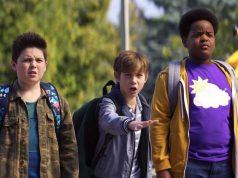We learn in “Waterborne” that our own human nature may be a greater threat to society than any terrorist attack. Like those Martians discovered on “The Twilight Zone” decades ago, all you have to do is make people THINK there’s a crisis and they’ll turn on each other soon enough.
The film presents a real crisis, though, not a rumored one: Someone has released a deadly biological agent into the water supply of Los Angeles. No tap water until the problem is solved. Set over the course of three days — with each day announced by an onscreen title and the rising action occurring right on schedule at the end of Day 2 — “Waterborne” is not about mass mayhem and rioting but about individuals reacting to the crisis based on their own situations. It’s not a thriller, as you might suspect, but a drama, rather “Crash”-like (though predating that film) in the way it establishes groups of Los Angelinos whose stories intersect in combustive ways.
A dedicated college student named Zach (Christopher Masterson) and his pothead cousin Bodi (Jake Muxworthy) try to get to Zach’s dad’s house somewhere north of the city. A National Guardsman named Ritter (Jon Gries) is called up to maintain order in the L.A. while his wife (Lindsay Price) stays home and worries. Out in the streets, Ritter has to contend with a hotheaded racist soldier (Christopher Berry).
Elsewhere, a Punjabi man, Vikram (Ajay Naidu), contends with his mother (Shabana Azmi), who runs a convenience store, fears attacks from citizens who blame all Arabs for the water situation, and disapproves of Vikram’s white Jewish girlfriend Lillian (Mageina Tovah) — a lot of worries for one woman at one time, but somehow Mom manages it.
Writer/director Ben Rekhi has constructed the film almost like a stage play, with scenes that are dialogue-oriented rather than packed with physical action. Some of that dialogue is clichéd, unfortunately. “What am I supposed to do while you’re out there playing the hero?!” Ritter’s wife exclaims. “It’s not you against the world!” Lillian tells Vikram. And the worst one: Zach tells his cousin, “I don’t even know you anymore!”
Rekhi also indulges in a few plot devices that ought to have been retired years ago, including The Character Who Pulls a Gun Out of Nowhere, and The Gunman Who Gets Shot from Behind by Someone We Didn’t Know Had Entered the Room. (You hear a shot — the gunman has fired! But no: The gunman himself was shot, by someone else. It happens on “Law & Order: SVU” like every other week.)
Yet I commend Rekhi for creating a film about such a volatile situation, filling it with so much dialogue, and still keeping it from feeling “talky.” The characters talk a lot, but it doesn’t seem like they talk too much. On the contrary, the things they discuss — how to handle the crisis, what it means for their lives, how it puts everything in perspective — are perfectly believable subjects given the circumstances.
The acting performances are all solid, each actor using the water crisis to bring out his character’s natural instincts, aggressions and flaws. Even without terrorists, it seems, we may be our own worst enemies. “Waterborne” makes that point with a compelling, highly watchable story.
B- (1 hr., 17 min.; )





